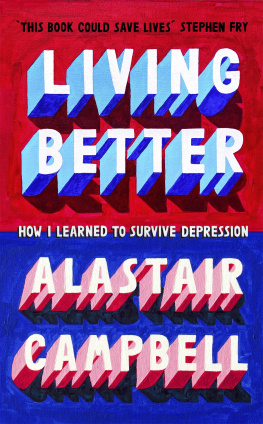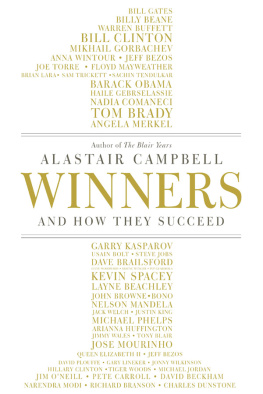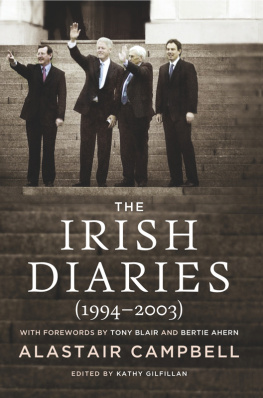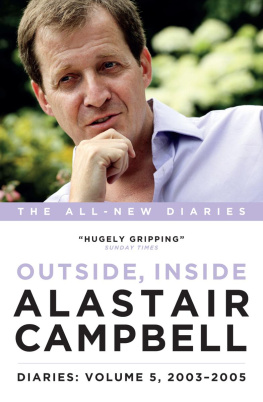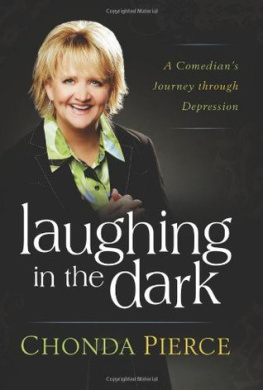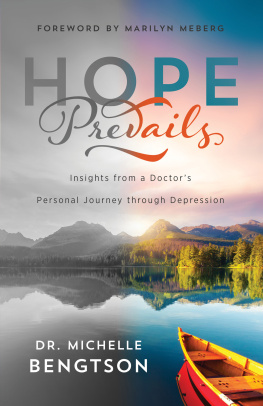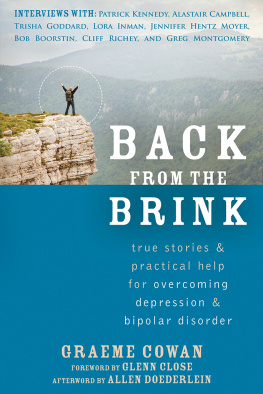Alastair Campbell is best known for his role as Tony Blairs chief spokesman and strategist. He has written several bestselling books, including The Blair Years and Winners . A former Mind Champion of the Year, he is an ambassador for several mental health charities. In November 2017 he was awarded an honorary fellowship of the Royal College of Psychiatrists in recognition of his role in breaking down the stigma surrounding mental illness.
Also by Alastair Campbell
Non-fiction
The Blair Years
Diaries Volume One: Prelude to Power 19941997
Diaries Volume Two: Power and the People 19971999
Diaries Volume Three: Power and Responsibility 19992001
Diaries Volume Four: The Burden of Power: Countdown to Iraq
The Happy Depressive: In Pursuit of Personal and Political Happiness
The Irish Diaries 19942003
Winners: And How They Succeed
Diaries Volume Five: Outside, Inside 20032005
Diaries Volume Six: From Blair to Brown 20052007
Diaries Volume Seven: From Crash to Defeat
Fiction
All in the Mind
Maya
My Name Is...
Saturday Bloody Saturday
Living Better
How I Learned to Survive Depression
Alastair Campbell
JOHN MURRAY
www.johnmurraypress.co.uk
First published in Great Britain in 2020 by John Murray (Publishers)
An Hachette UK company
Copyright Alastair Campbell 2020
Afterword Fiona Millar 2020
The right of Alastair Campbell to be identified as the Author of the
Work has been asserted by him in accordance with
the Copyright, Designs and Patents Act 1988.
Cover image: Naomi Edmondson www.survivaltechniques.co.uk
All rights reserved. No part of this publication may be reproduced,
stored in a retrieval system, or transmitted, in any form or by any
means without the prior written permission of the publisher, nor be
otherwise circulated in any form of binding or cover other than that
in which it is published and without a similar condition being
imposed on the subsequent purchaser.
A CIP catalogue record for this title is available from the British Library
eBook ISBN 978-1-529-33184-4
John Murray (Publishers)
Carmelite House
50 Victoria Embankment
London EC4Y 0DZ
www.johnmurraypress.co.uk
For F, F and F
Contents
Preface
On a dark Sunday night last winter, I almost killed myself. Almost. Ive had a lot of almosts. Never gone from almost to deed. Dont think I ever will. But it was a bad almost. Bad. That I didnt go through with it had a lot to do with a jam jar.
Its a long story. Ill start at the beginning.
I
Me, My Life, My Depression
My Childhood, My Family
On the face of it, I have it all. A wonderful partner with whom I have shared forty years of my life. Three amazing children who make me incredibly proud to be their dad. I have great friends. A nice home. A dog I love and who loves me even more. Money is not a problem. I have had several satisfying careers, first as a journalist, then in politics and government. Now I get paid to tour the world and tell audiences what I think. I have the freedom to campaign for the causes I believe in, something not always present in my previous two careers: as a journalist I was dependent on events; in politics, I had to subsume my life into the needs and demands of others. With todays freedom, I can pick and choose, and I do. So when I decided to write this book, for example, I did just that, and pushed other things into the background. Because I can.
But there is one major part of my life that I cannot control. Depression. It is a bastard; despite all my good luck and opportunities, all the things that should ensure I am happy and fulfilled, it keeps coming. This book is an attempt to explain my depression, to explore it, to make sense of it, properly to understand it where it may have come from, why it keeps coming and what, if anything, I can do to live a better life despite it.
In doing so, I hope to be able to find answers that may help me, and that my story and the telling of it may help others too. We all know someone with depression. There is barely a family untouched by it. We may be talking about it more than we did, back in the era of big boys dont cry they did, you know when a brave face or a stiff upper lip or a best foot forward was seen as the only way to go. But we still dont talk about it enough. There is still stigma, shame and taboo. There is still the feeling that admitting to being sad or anxious, let alone chronically depressed, makes us weak. It took me years, decades even, to get to this point, but I now passionately believe that the reverse is true and that speaking honestly about our feelings and experiences (whether as a depressive or as the friend or relative of a depressive) is the first and best step on the road to recovery. So that is what I am trying to do here.
To begin with, I want to go right back to the start, to my birth, my family and the broadly happy childhood which followed.
Once there were six of us. And now we are just two.
We were a family of exiles: an intensely Scottish family living in England. My Dad, Donald Campbell, was a crofters son born on the Hebridean island of Tiree in 1922. My mother Betty, four years younger, was the daughter of an Ayrshire farmer. They met when my Dad, then a student vet at Glasgow University, was visiting the farm where she grew up. Once they got engaged, the marriage almost never happened, because my Dad insisted he would never leave Scotland. My Mum called off the engagement and headed south herself, to work in a London hotel; eventually he followed, first working in Hampshire, then as a full partner in practice with fellow Scot, Murdo Ferguson, in Keighley in the James Herriot territory of Yorkshire. That was where we four children were all born, in Victoria Hospital. I was the third boy in a row, born on 25 May 1957. My sister Elizabeth, born two years later, owes her life to the fact that my mother was determined to keep going till she had a daughter. Had I been a girl we would have been five not six.
That we are now just two, me and Liz, is because our older brothers Donald and Graeme died prematurely. They were both aged sixty-two. Which is, worryingly enough, my age right now.
I was closest in age to Graeme, who was born just thirteen months before me, and for long periods of our childhood we were inseparable. Considering that we spent most of our upbringing sharing a bedroom, and had a shared passion for sport and, later, languages, I often think we should have been closer as adults. He was clever, funny, but never made the most of his undoubted talents. He had next to no interest in wealth, material comfort or making a good career.
Of the four of us, he was the least enamoured of our Scottish identity. Donald and I both took up Dads offer to teach us to play the bagpipes. Graeme refused, referring to our chosen instrument, which required considerable time devoted to practice, simply by the anagram gabsepip! And while Donald and I felt no embarrassment, and even a certain pride, in dressing up in a kilt, Graeme made so clear his objection to being asked to wear a skirt that before long, Mum and Dad gave up trying to persuade him.
He dropped out of his first university, though did OK at the next one, then went off to America one day for a short trip and didnt come back for years. When Donald visited him once, he was shocked at the squalor he lived in, with a mattress, a sleeping bag and not much else. He lived for a while in Poland, mainly teaching English, and there he met his wife, Ania, and they had a son, Mike. The marriage failed, not least because of his drinking, and though he improved on the father front in later years, by then the damage to his health caused by decades of heavy smoking, drinking and a peripatetic lifestyle meant he didnt have long left to go.
Next page
